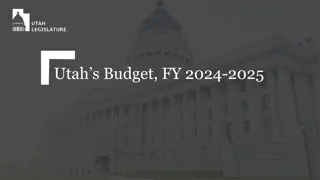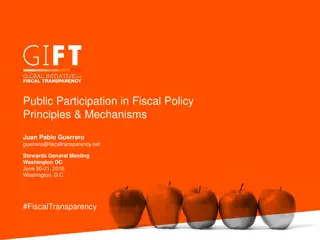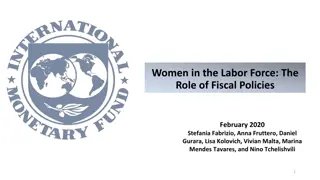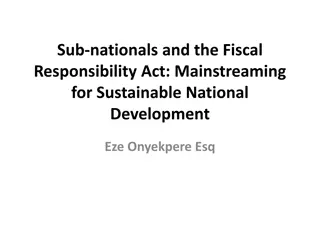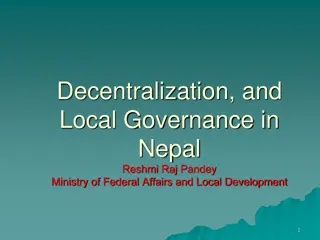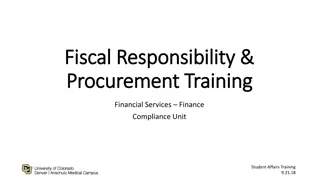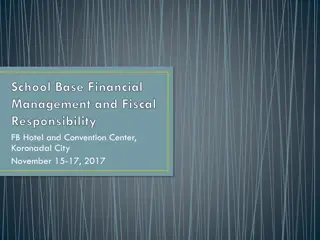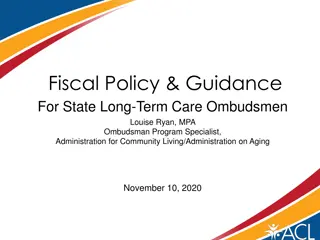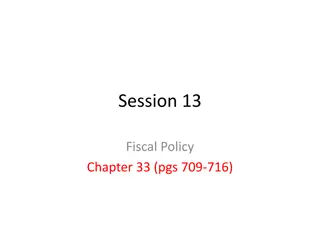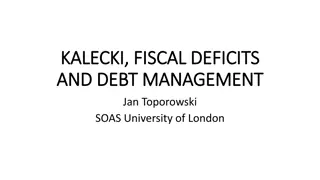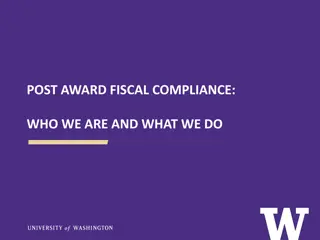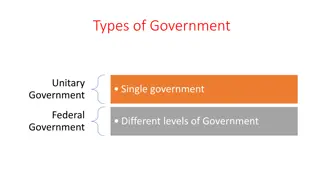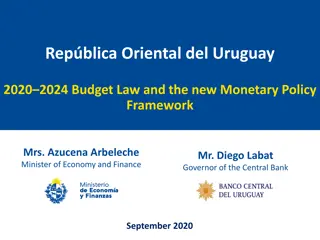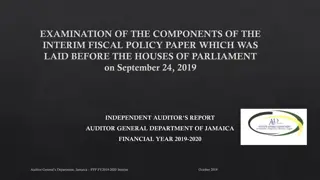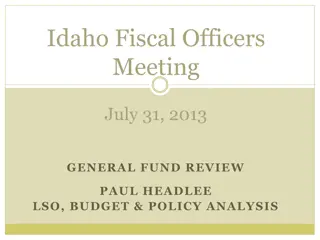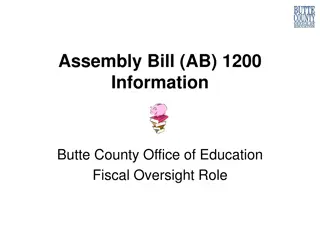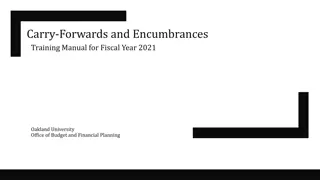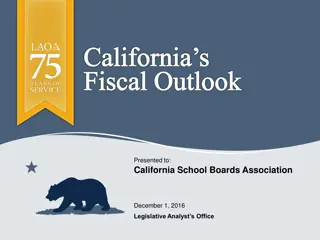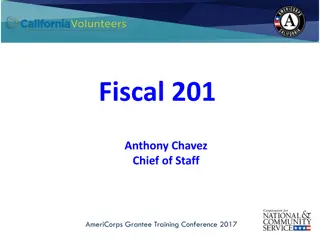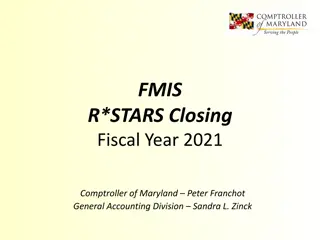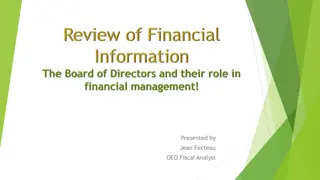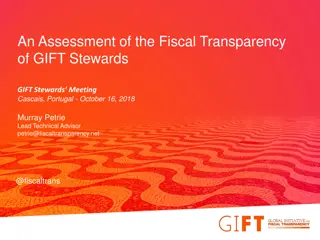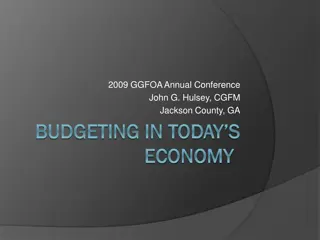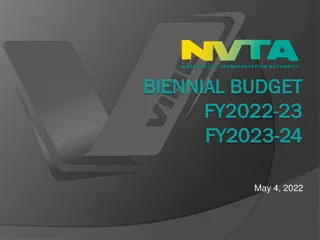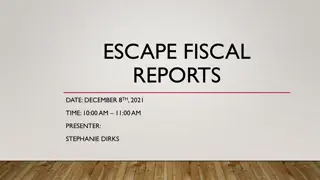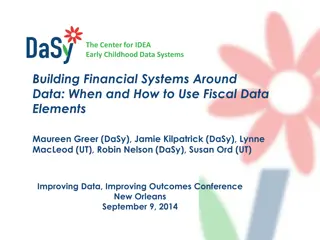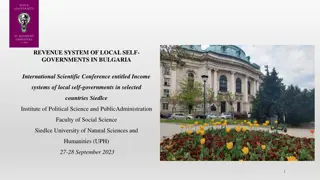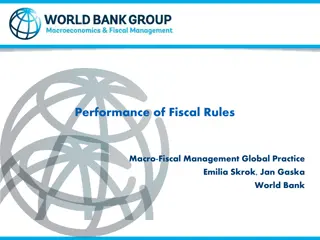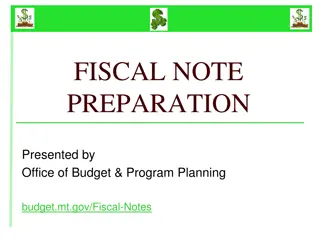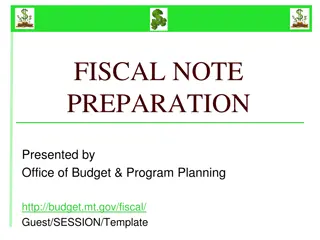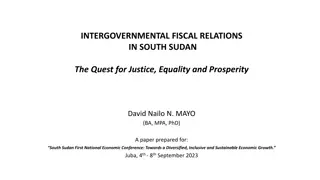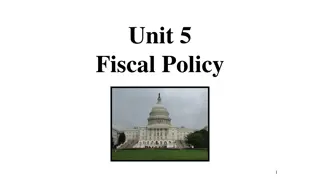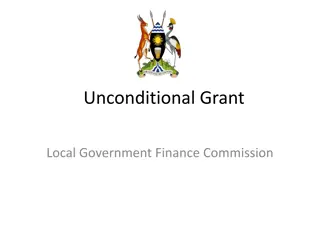Relevance of Countercyclical Fiscal Policy and Fiscal Acyclicality
This literature review examines the effectiveness of countercyclical fiscal policies in stabilizing output and enhancing welfare, with a focus on the correlation between public spending cycles and GDP cycles. The study analyzes examples from Sweden and Argentina to showcase the impact of fiscal poli
2 views • 29 slides
Understanding Decentralization: Insights from International Experience
Insights from international experiences on decentralization policies, focusing on fiscal and political decentralization, with examples from Africa, China, and Latin America. Discusses the limitations of fiscal decentralization and the role of Constituency Development Funds in enhancing accountabilit
1 views • 24 slides
Insights on Decentralization Policies: International Perspectives
Understanding the dynamics of decentralization is crucial for effective governance. Insights from global research highlight the challenges in fiscal decentralization, the significance of political decentralization, and the limited scope of Constituency Development Funds in enhancing local governance
1 views • 24 slides
Overview of Utah's Budget for FY 2024-2025
Utah's budget for the fiscal year 2024-2025 is outlined with details on revenue sources, budget priorities, special funding, long-term fiscal health, and budget process changes. The budget allocations cover various sectors including education, transportation, law enforcement, social services, and mo
0 views • 32 slides
Principles of Public Participation in Fiscal Policy
The work by GIFT focuses on developing principles for public participation in fiscal policy, emphasizing the importance of citizen engagement beyond mere disclosure. These principles aim to enhance accountability, uphold citizens' rights, and improve policy quality through inclusiveness and openness
0 views • 17 slides
Gender-Responsive Fiscal Policies and Female Labor Force Participation
Despite persistent gender gaps in labor force participation and wages, various fiscal policy measures have been adopted globally since the mid-1980s to address these disparities. Understanding the impact of gender-responsive fiscal policies on female labor force participation, economic growth, incom
0 views • 23 slides
Fiscal Responsibility Act & Sustainable Development Nexus
Sustainable development integrates environmental health with economic progress. Achieving SDGs requires fiscal responsibility at all levels of governance. Subnational fiscal irresponsibility impacts national growth. It is crucial to manage public resources effectively to attain sustainable developme
0 views • 48 slides
Decentralization and Local Governance in Nepal: A Comprehensive Overview
Explore the essence of decentralization and local governance in Nepal, highlighting the process, benefits, and global significance. Understand how these initiatives promote democratization, equity, and effective service delivery while fostering good governance and citizen participation. Discover the
0 views • 32 slides
Financial Responsibility and Procurement Training Overview
This overview covers key aspects of financial responsibility, procurement training, and fiscal roles within a university setting. It emphasizes protecting university resources, ensuring compliance with laws and regulations, and upholding ethical standards. It discusses the responsibilities and roles
0 views • 33 slides
Enhancing Fiscal Policy Planning through Public Participation and Transparency
Explore the importance of public participation and meaningful transparency in fiscal policy planning and public expenditure management. Learn about the GIFT Network, its champions and stewards, and how fiscal transparency and public participation can lead to improved fiscal and development outcomes
0 views • 22 slides
School-Based Financial Management and Fiscal Responsibility in Education Governance
School-Based Financial Management and Fiscal Responsibility is crucial for the effective operation of educational institutions. With the implementation of shared governance principles and fiscal autonomy under the School-Based Management System (SBM), schools can efficiently manage their financial r
0 views • 15 slides
Fiscal Policy Guidance for State Long-Term Care Ombudsmen
Overview of the fiscal management responsibilities for State Long-Term Care Ombudsmen under the Older Americans Act requirements. Covers topics such as fiscal management, funding allocations, state plan requirements, and fiscal responsibilities. Details the OAA and LTCOP rule provisions related to f
6 views • 22 slides
Understanding Fiscal Policy: A Comprehensive Overview
Fiscal policy involves changes in government spending and taxes to influence macroeconomic objectives like employment, price stability, and economic growth. It includes expansionary and contractionary policies to manage aggregate demand and stabilize the economy. This overview covers types of fiscal
0 views • 24 slides
Principles of Fiscal Deficits and Debt Management According to Kalecki
Economist Kalecki advocated for a permanent regime of fiscal deficits to manage public debt, emphasizing the importance of debt management for liquidity in the financial system. His principles involve splitting the government budget into functional and financial parts, each influencing aggregate dem
0 views • 6 slides
Post Award Fiscal Compliance: Who We Are and What We Do
Post Award Fiscal Compliance (PAFC) assists campus and central administrative units in mitigating non-compliance risks with sponsor terms and conditions by monitoring compliance, interpreting award requirements, providing training, and enhancing internal controls. The team includes Matt Gardner, Ass
0 views • 11 slides
Understanding Fiscal Federalism and Decentralization in Government Systems
Fiscal federalism involves the allocation of responsibilities and resources between central and local governments, addressing key issues such as regulation, incentives for resource transfer, and financial balance. Fiscal decentralization, on the other hand, focuses on transferring taxing and spendin
0 views • 16 slides
Year-End Closing Checklist for School Fiscal Services
Review key areas such as tax revenue, grants, grant revenue, lease rental fund revenue, accruals, deferred outflow, liabilities, and deferred inflow to properly prepare for the year-end closing in school fiscal services. Ensure accuracy in financial records and compliance with regulations for a smoo
0 views • 21 slides
Economic Recovery and Fiscal Stability in Uruguay: Budget Law and Monetary Policy Framework 2020-2024
The Budget Law and Monetary Policy Framework in Uruguay for 2020-2024 focus on restoring fiscal consolidation, stabilizing debt, and implementing market-friendly policies for economic recovery. Successful COVID-19 containment strategies have allowed for a faster normalization of economic activity. L
2 views • 35 slides
Examination of Interim Fiscal Policy Paper for Financial Year 2019-2020
An independent auditor's report on the interim fiscal policy paper laid before the Houses of Parliament, confirming compliance with the requirements of the FAA Act. The report assesses the components, conventions, and assumptions underlying the paper for fiscal responsibility, macroeconomic framewor
1 views • 15 slides
Idaho Fiscal Officers Meeting - General Fund Review July 31, 2013
Fiscal officers in Idaho reviewed the General Fund for the fiscal year 2013, analyzing revenue growth, transfers, appropriations, and historical data. The meeting discussed actual revenue figures, beginning balances, cash reversions, budget stabilization funds, total appropriations, and estimated en
0 views • 5 slides
Butte County Office of Education Fiscal Oversight Role Overview
The Assembly Bill (AB) 1200 provides insights into the fiscal oversight role of Butte County Office of Education (BCOE). It outlines the responsibilities of local boards of education, BCOE as an intermediary agent, and the creation of the Financial Crises and Management Assistance Team (FCMAT) in 19
0 views • 12 slides
Carry-Forwards and Encumbrances Training Manual Overview
This manual provides detailed insight into the carry-forwards and encumbrances process for fiscal year 2021 at Oakland University, covering key definitions, general funds, controllable accounts, unexpended controllable budget, encumbrances, process purposes, deadlines, and submissions. It emphasizes
0 views • 18 slides
California's Fiscal Outlook Presentation to California School Boards Association
California's fiscal outlook was presented to the California School Boards Association by the Legislative Analyst's Office in December 2016. The report highlights a decrease in revenues and expenditures for the 2016-17 fiscal year, leading to a revised reserve down by $1 billion. However, the state i
0 views • 22 slides
AmeriCorps California Volunteers Fiscal Training Conference 2017 Details
In July 2017, the AmeriCorps Grantee Training Conference took place, focusing on fiscal procedures, compliance, desk reviews, and monitoring. The conference covered topics such as improper payments elimination, common audit findings, and the fiscal desk review process implemented by California Volun
2 views • 22 slides
FMIS.R*STARS Closing Fiscal Year 2021 - Comptroller of Maryland Guidelines
Guidelines from the Comptroller of Maryland for the FMIS.R*STARS closing of fiscal year 2021 include deadline dates, DBM requirements, payroll accruals, budget amendments, and cash/adjusting transactions. Agencies must adhere to specific instructions for fiscal year closure processes.
1 views • 85 slides
Fiscal Oversight and Responsibilities for Nonprofit Boards
Understand the basic requirements and responsibilities of nonprofit Boards in fiscal oversight, assessing members' financial knowledge, establishing Finance Committees, and adhering to Organizational Standards. Learn about the fiduciary responsibilities of Boards, setting up different Committees, an
0 views • 17 slides
Assessment of Fiscal Transparency Among GIFT Stewards
This assessment analyzes the fiscal transparency of GIFT Stewards and Partners in 20 countries using various data sources. It aims to encourage peer learning, stimulate discussions on enhancing fiscal openness, and promote more robust reforms and OGP commitments. The evaluation highlights improvemen
0 views • 18 slides
Fiscal Stress Diagnosis and Budget Strategies in Today's Economy
This content discusses identifying symptoms and causes of fiscal stress in government budgets, distinguishing between cyclical and structural deficits, and selecting appropriate strategies to address budget challenges. Topics include inadequate cash flow, deficit financing, debt restructuring, and e
0 views • 32 slides
Fiscal Year 2023 Budget Overview
The content presents detailed information on the fiscal year 2023 budget, including budget cycles, comparisons between fiscal years, source of funds, expenditure plans, and top projects for the Consolidated Municipal Agency (CMA). It covers budget development processes, funding sources, expenditure
0 views • 11 slides
Emerging Markets Investors Alliance and GIFT: Promoting Fiscal Transparency
The Emerging Markets Investors Alliance, in partnership with GIFT (Global Initiative for Fiscal Transparency), aims to educate institutional investors about fiscal transparency and facilitate investor advocacy with governments. Through roundtable discussions and engagements with finance ministers, t
0 views • 5 slides
Understanding Fiscal Reports and Budgeting Process
Dive into the world of fiscal reports and budgeting with a presentation led by Stephanie Dirks. Explore the Budget Code Story, different types of reports, and examples of Fiscal 04 & Fiscal 06 reports. Learn about Fund allocations, Object Codes, and responsible oversight of funds. Get insights into
0 views • 17 slides
Building Financial Systems Around Fiscal Data in Early Childhood Programs
Understand the importance of fiscal data in program management, identify key fiscal data elements, address policy questions, and learn from a state's cost study design. Explore the significance of fiscal data for decision-making, policy development, and program management, with a focus on revenue so
0 views • 31 slides
Revenue System of Local Self-Governments in Bulgaria
The revenue system of local self-governments in Bulgaria has evolved since the democratic changes in 1990, focusing on decentralization and fiscal autonomy. Key documents and programs have shaped the revenue mechanisms, allowing municipalities to set local fees, introduce debt financing, and gain ta
0 views • 18 slides
Global Practices in Fiscal Rule Performance
The study explores the implementation and impact of fiscal rules on macro-fiscal management, focusing on international experiences. It discusses the presence and compliance with fiscal rules, highlighting differences in pro-cyclicality among small and large countries. The rise in adoption of nationa
0 views • 23 slides
Understanding Fiscal Notes in Government Legislation
Fiscal notes are essential documents accompanying bills affecting finances of state entities. They detail revenue, expenditure, and fiscal impact, requiring a 6-day processing timeline. The need for a fiscal note may be determined by legislative services, committees, sponsors, or agencies. The proce
1 views • 30 slides
Fiscal Note Preparation Process and Guidelines
Fiscal notes are essential for bills affecting state finances. This includes the total processing time, exceptions, and what to do if there is disagreement on the fiscal note. The process involves multiple steps, including drafting, review, and resolution of disagreements. The President of the Senat
0 views • 29 slides
Intergovernmental Fiscal Relations in South Sudan: A Quest for Justice, Equality, and Prosperity
This paper explores intergovernmental fiscal relations in South Sudan, focusing on decentralization, taxation, spending, grants, equalization, and transfers to oil-producing states. It discusses the importance of fiscal federalism, the evolution of decentralization in Sudan, and the country's depend
0 views • 21 slides
Understanding Government Tools for Economic Stability
The government uses fiscal and monetary policies to stabilize the economy. Fiscal policy involves Congress's actions through government spending or taxation changes, while monetary policy is driven by the Federal Reserve Bank. Discretionary fiscal policy involves new bills designed to adjust aggrega
0 views • 36 slides
Improving Local Government Finance Commission through Unconditional Grants
Addressing issues surrounding grants allocation and transparency to enhance local government finance. Efforts include implementing fiscal decentralization architecture, reviewing grants allocation formulae, and prioritizing sustainable financing for local governments.
0 views • 27 slides
Centralization vs Decentralization: A Comparative Analysis
This lecture delves into the dynamics of centralization and decentralization in subnational politics, exploring the benefits of each system, differences between federal and unitary government structures, challenges in reconciling territorial differences, reasons for the increasing popularity of cent
0 views • 15 slides



